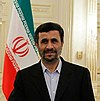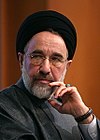Mohammad Saeedikia
Mohammad Saeedikia | |
|---|---|
 | |
| Head of Mostazafan Foundation | |
| In office 22 July 2014 – 22 July 2019 | |
| Appointed by | Ali Khamenei |
| Preceded by | Mohammad Forouzandeh |
| Succeeded by | Parviz Fattah |
| Minister of Housing | |
| In office 24 August 2005 – 9 August 2009 | |
| President | Mahmoud Ahmedinejad |
| Preceded by | Ali Abdolalizadeh |
| Succeeded by | Ali Nikzad |
| Minister of Jihad of Construction | |
| In office 19 August 1997 – 14 January 2001 | |
| President | Mohammad Khatami |
| Preceded by | Gholamreza Forouzesh |
| Succeeded by | Mahmoud Hojjati (Merged in Agriculture Ministry) |
| Minister of Transportation | |
| In office 1985 – 6 September 1993 | |
| President | Ali Khamenei Akbar Hashemi Rafsanjani |
| Prime Minister | Mir-Hossein Mousavi |
| Preceded by | Hadi Nejad-Hosseinian |
| Succeeded by | Akbar Torkan |
| Personal details | |
| Born | 1946 (age 77–78) Isfahan, Iran |
| Residence | Tehran |
| Alma mater | Amirkabir University of Technology |
Mohammad Saeedikia (born 1946) is an Iranian politician who is the former head of Bonyad-e Mostazafen va Janbazan (Foundation of the Oppressed and Disabled), from 2014 to 2019.
He served as government minister in different cabinets, the last of which was minister of housing and urban development from 2005 to 2009.
Early life and education
Saeedikia was born in Isfahan in 1946.[1][2] He received a bachelor's degree in mathematics.[2] Then he obtained a master's degree in civil engineering from Amirkabir University of Technology in Tehran.[1]
Career
Saeedikia was the chairman of the urban planning and development corporation.[3] Then he became deputy chief of the economic branch of the foundation of deprived.[2] Later he served in most of the cabinets formed since the Islamic Revolution of 1979.[4] His first cabinet post was the minister of roads and transportation. He held this post firstly in the cabinet of the then prime minister Mir Hossein Mousavi from 1985 to 1989. He was also in office in the cabinet of the then-president Akbar Hashemi Rafsanjani from 1989 to 1993. On 29 August 1989, Saeedikia was approved by the Majlis with 195 for and 43 against votes.[5] His tenure lasted until 1993.
When Mohammad Khatami became president in 1997, Saeedikia was named minister of construction.[6][7] He was in office from 1997 to 2000.[1] Then he served as presidential advisor to Khatami from 2000 to 2005.[1]
On 24 August 2005, then new president Ahmadinejad appointed him the minister of housing and urban development.[3][8] Saeedikia won the highest for votes at the Majlis, being given 222 votes for by 284 majlis members.[9][10] His term ended in 2009.[11] He also served as the head of the Asia Pacific Ministerial Conference on Housing and Urban Development from May 2008 to August 2009.[11] In January 2010, he was appointed the deputy head of the Pars Oil Company.[12]
He is currently head of the Bonyad-e Mostazafen va Janbazan (Foundation of the Oppressed and Disabled), the second-largest commercial enterprise in Iran (behind the state-owned National Iranian Oil Company)[13] and biggest holding company in the Middle East.
Candidacy for 2013 elections
Saeedikia was the first officially announced candidate for the 2013 presidential election in Iran.[11] He announced his candidacy in December 2012.[14] Due to his career, he was considered to be a traditionalist principlist candidate, but in fact he was an independent and technocrat candidate.[15][16] Saeedikia was also one of the dark horse candidates.[17] His nomination was rejected by Guardian Council on 21 May 2013.[18][19]
References
- ^ a b c d "Potential Candidate Series: Mohammad Saeedikia". Iran Election Watch. Archived from the original on 1 February 2013. Retrieved 10 February 2013.
- ^ a b c Ali Alfoneh (May 2008). "Ahmadinejad versus the Technocrats" (PDF). Middle East Outlook. 4: 1–9. Archived from the original (PDF) on 11 November 2013. Retrieved 18 February 2013.
- ^ a b "New ministers hail from Revolutionary Guards". Iran Focus. 14 August 2005. Retrieved 10 February 2013.
- ^ "Iran Election Watch 2013: Twenty four presidential candidates emerge". The International. 21 March 2013. Archived from the original on 6 June 2014. Retrieved 19 April 2013.
- ^ Ehteshami, Anoushiravan (1991). "After Khomeini: the Structure of Power in the Iranian Second Repuhlic". Political Studies. XXXIX: 148–157. doi:10.1111/j.1467-9248.1991.tb00586.x.
- ^ "Net spread for biological research partners". Iran Report. 2 (12). 22 March 1999. Retrieved 10 February 2013.
- ^ "President Mohammad Khatami's Cabinet August 1997". Iran. Retrieved 23 February 2013.
- ^ "Ideologues Proposed to Fill Iranian Cabinet". Ohmy News. 18 August 2005. Retrieved 19 April 2013.
- ^ "Iran parliament confirms key hardline ministers". Iran Focus. 24 August 2005. Retrieved 10 February 2013.
- ^ "Proposed ministers receive votes of confidence". Payvand. 25 August 2005. Retrieved 1 July 2013.
- ^ a b c Rezai, Ahmad (31 December 2012). "Mohammad Saeedi-Kia announces his nomination for presidential election". Kabir News. Retrieved 10 February 2013.
- ^ "Appointment for Former Iran Petroleum Minister". BEDigest. 20 January 2010. Retrieved 10 February 2013.
- ^ Millionaire mullahs by Paul Klebnikov, 7 July 2003, The Iranian Originally printed in Forbes, Retrieved 15 May 2009
- ^ "Former minister announces candidacy for presidential election". Tehran Times. 18 January 2013. Archived from the original on 11 March 2013. Retrieved 10 February 2013.
- ^ "Consolidated list of presidential candidates". Iran Daily Brief. 18 April 2013. Retrieved 19 April 2013.
- ^ Al Labbad, Mustafa (May 2013). "The Favorites in Iran's Election". As Safir. Retrieved 16 June 2013.
- ^ "Who Will Be Iran's Next President?". Radio Free Liberty. 6 January 2013. Retrieved 19 April 2013.
- ^ "Profiles: Iran election candidates". BBC. 22 May 2013. Retrieved 22 May 2013.
- ^ Bahmani, Arash (22 May 2013). "The Arbiter of State Expediency is Disqualified". Rooz Online. Archived from the original on 12 December 2017. Retrieved 16 June 2013.



